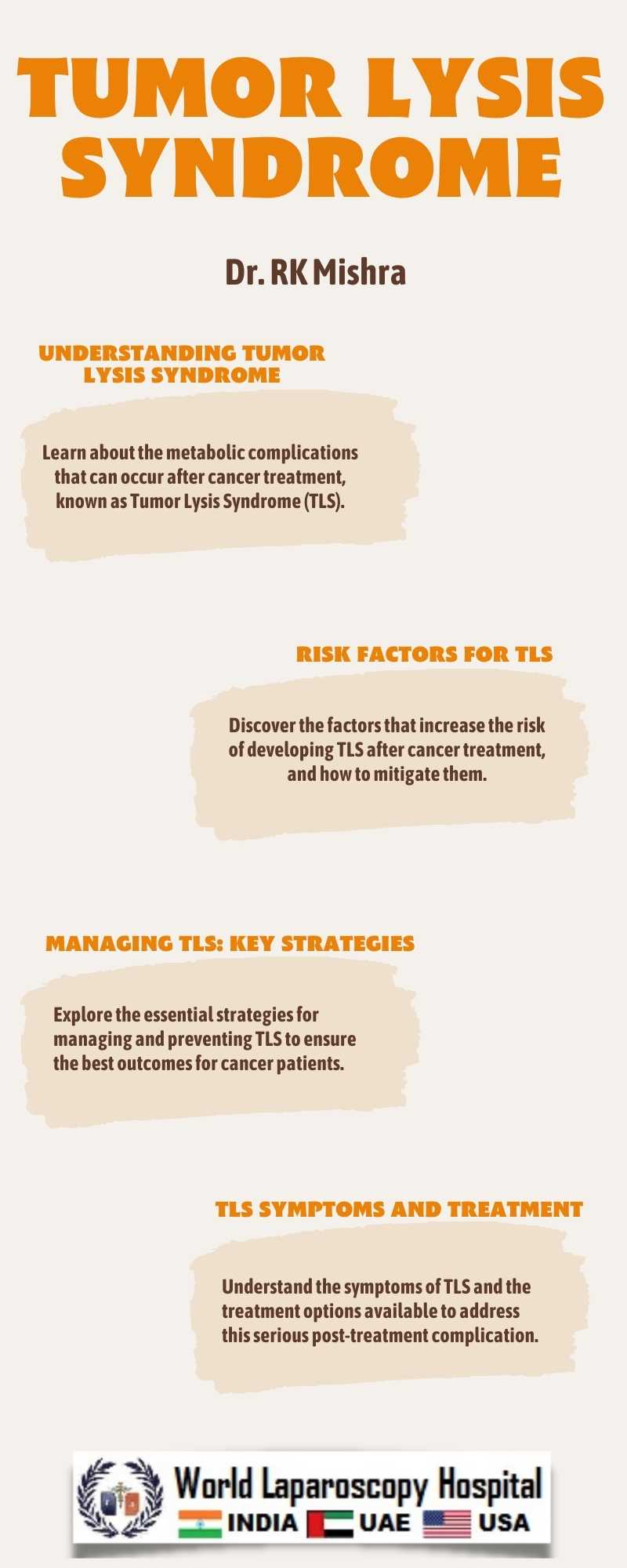Tumor Lysis Syndrome: Metabolic Complications Post-Cancer Treatment
Tumor Lysis Syndrome (TLS) is a potentially life-threatening oncological emergency that can occur after the initiation of cancer treatment, particularly in rapidly proliferating or large tumor burdens. TLS is characterized by the rapid release of intracellular contents into the bloodstream, leading to metabolic disturbances such as hyperuricemia, hyperkalemia, hyperphosphatemia, and hypocalcemia. These metabolic abnormalities can result in severe complications, including acute renal failure, cardiac arrhythmias, seizures, and even death if not promptly recognized and managed.

TLS typically occurs within the first few days to weeks of initiating cancer treatment, although it can occur spontaneously in patients with highly proliferative tumors. It is most commonly associated with hematologic malignancies such as leukemia, lymphoma, and multiple myeloma, but can also occur in solid tumors, especially those with a high proliferative rate, such as Burkitt lymphoma and small cell lung cancer.
The pathophysiology of TLS involves the rapid lysis of tumor cells, leading to the release of large amounts of intracellular contents into the bloodstream. This includes potassium, phosphate, and nucleic acids, which can overwhelm the body's normal metabolic pathways, leading to the development of hyperkalemia, hyperphosphatemia, and hyperuricemia. Hyperkalemia can result in cardiac arrhythmias and sudden cardiac death, while hyperphosphatemia can lead to acute kidney injury due to the precipitation of calcium phosphate crystals in the renal tubules. Hyperuricemia can cause acute kidney injury through the formation of uric acid crystals in the renal tubules and can also lead to gouty arthritis and uric acid nephropathy.
The clinical presentation of TLS can vary depending on the severity of the metabolic abnormalities. Patients may present with nonspecific symptoms such as nausea, vomiting, diarrhea, lethargy, and muscle weakness. Severe cases can present with acute renal failure, cardiac arrhythmias, seizures, and altered mental status. Laboratory findings typically include elevated serum levels of uric acid, potassium, phosphate, and lactate dehydrogenase, along with a decrease in serum calcium levels.
Management of TLS involves aggressive supportive care and the prevention of further metabolic derangements. This includes hydration with intravenous fluids to promote the excretion of uric acid and prevent the formation of renal crystals, as well as the use of diuretics to enhance uric acid excretion. Allopurinol or rasburicase may be used to lower serum uric acid levels and prevent the development of uric acid nephropathy. In severe cases, hemodialysis may be required to manage electrolyte abnormalities and remove uric acid and other metabolic byproducts.
Conclusion:
Tumor Lysis Syndrome is a serious complication that can occur after the initiation of cancer treatment, particularly in patients with highly proliferative tumors. Prompt recognition and management are essential to prevent severe complications and improve patient outcomes. Healthcare providers should be aware of the risk factors for TLS and monitor patients closely during cancer treatment to identify and manage TLS early.

TLS typically occurs within the first few days to weeks of initiating cancer treatment, although it can occur spontaneously in patients with highly proliferative tumors. It is most commonly associated with hematologic malignancies such as leukemia, lymphoma, and multiple myeloma, but can also occur in solid tumors, especially those with a high proliferative rate, such as Burkitt lymphoma and small cell lung cancer.
The pathophysiology of TLS involves the rapid lysis of tumor cells, leading to the release of large amounts of intracellular contents into the bloodstream. This includes potassium, phosphate, and nucleic acids, which can overwhelm the body's normal metabolic pathways, leading to the development of hyperkalemia, hyperphosphatemia, and hyperuricemia. Hyperkalemia can result in cardiac arrhythmias and sudden cardiac death, while hyperphosphatemia can lead to acute kidney injury due to the precipitation of calcium phosphate crystals in the renal tubules. Hyperuricemia can cause acute kidney injury through the formation of uric acid crystals in the renal tubules and can also lead to gouty arthritis and uric acid nephropathy.
The clinical presentation of TLS can vary depending on the severity of the metabolic abnormalities. Patients may present with nonspecific symptoms such as nausea, vomiting, diarrhea, lethargy, and muscle weakness. Severe cases can present with acute renal failure, cardiac arrhythmias, seizures, and altered mental status. Laboratory findings typically include elevated serum levels of uric acid, potassium, phosphate, and lactate dehydrogenase, along with a decrease in serum calcium levels.
Management of TLS involves aggressive supportive care and the prevention of further metabolic derangements. This includes hydration with intravenous fluids to promote the excretion of uric acid and prevent the formation of renal crystals, as well as the use of diuretics to enhance uric acid excretion. Allopurinol or rasburicase may be used to lower serum uric acid levels and prevent the development of uric acid nephropathy. In severe cases, hemodialysis may be required to manage electrolyte abnormalities and remove uric acid and other metabolic byproducts.
Conclusion:
Tumor Lysis Syndrome is a serious complication that can occur after the initiation of cancer treatment, particularly in patients with highly proliferative tumors. Prompt recognition and management are essential to prevent severe complications and improve patient outcomes. Healthcare providers should be aware of the risk factors for TLS and monitor patients closely during cancer treatment to identify and manage TLS early.
1 COMMENTS
Dr. Aniket Khapekar
#1
Feb 27th, 2024 4:58 pm
Tumor Lysis Syndrome poses significant risks post-cancer treatment, especially with highly proliferative tumors. Early recognition and management are vital for averting severe complications and enhancing patient outcomes. Healthcare providers must remain vigilant, monitoring closely to identify and address TLS promptly.
| Older Post | Home | Newer Post |

